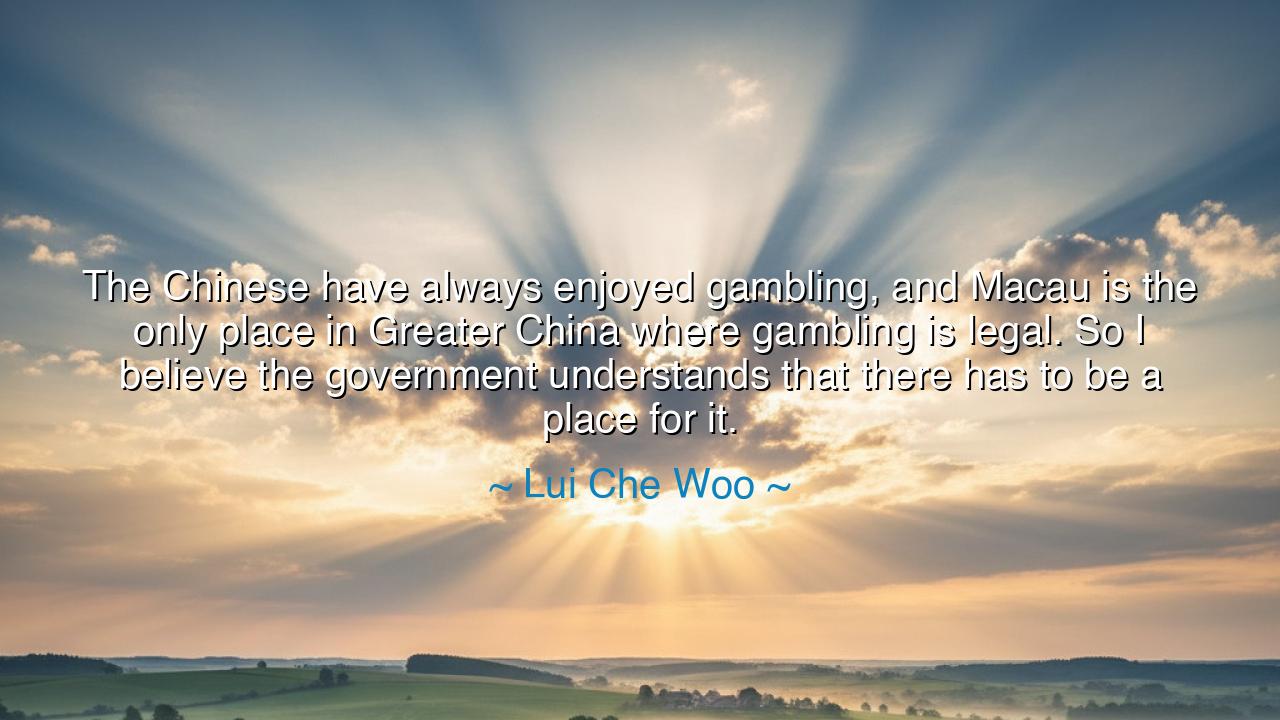
The Chinese have always enjoyed gambling, and Macau is the only
The Chinese have always enjoyed gambling, and Macau is the only place in Greater China where gambling is legal. So I believe the government understands that there has to be a place for it.






The words of Lui Che Woo, the Hong Kong-born tycoon and visionary behind the grandeur of Macau’s modern casinos, carry both pragmatism and profound understanding of human nature: “The Chinese have always enjoyed gambling, and Macau is the only place in Greater China where gambling is legal. So I believe the government understands that there has to be a place for it.” In this statement, there lies more than business acumen—it is a reflection on the eternal relationship between desire and discipline, between human instinct and the wisdom of governance. Lui speaks not as one glorifying indulgence, but as one acknowledging that even the most ancient passions of humankind must find their proper place in the order of society.
At its heart, the quote is about balance. It is an age-old truth that every civilization must decide how to deal with the appetites of its people. For as long as there have been men and women, there has been the thrill of risk—the chance to win or lose by fate’s invisible hand. In the temples of ancient China, in the streets of Rome, in the taverns of Europe, and the gaming houses of Macau, this instinct has endured. Lui’s words suggest that the government’s wisdom lies not in suppressing such desires altogether, but in channeling them toward harmony rather than chaos. For when passions are denied entirely, they return in darker, ungoverned forms. To allow them a place—like Macau—is to acknowledge the truth of human nature while preserving the order of the realm.
The origin of Lui’s statement rests in the long history of gambling in Chinese culture and the unique role of Macau, often called the “Monte Carlo of the East.” Since the 16th century, this small enclave has been a crossroads of trade, culture, and fortune. It was the Portuguese who first brought legal gambling to Macau, and when the territory returned to Chinese sovereignty in 1999, the tradition continued under the watchful eye of Beijing. While gambling was prohibited elsewhere in China, the government allowed Macau to remain its designated outlet—a safety valve for both economic ambition and the restless spirit of risk. Lui Che Woo, a pioneer in the development of Macau’s casino resorts, understood this arrangement as both practical and profound. It was not merely a business opportunity, but a reflection of statecraft shaped by human understanding.
History provides many examples of such wisdom. In ancient Rome, where the populace hungered for entertainment, emperors provided the Circus Maximus—a place where passions could be released through spectacle rather than rebellion. Likewise, in China’s imperial dynasties, emperors permitted festivals and games as expressions of joy and release, recognizing that the pulse of the people cannot be forever restrained. In both East and West, wise rulers have learned to govern not by eradicating human desire, but by guiding it—to transform chaos into culture, indulgence into industry. Macau, in Lui’s eyes, is a modern reflection of that same ancient principle.
Yet there is another layer to Lui’s insight—one that touches the moral fabric of society. For in acknowledging the inevitability of gambling, he also implies that with freedom comes responsibility. To give a place for human desire is not to endorse excess; it is to accept the challenge of governing it. Macau’s prosperity, after all, is built upon both regulation and restraint. The casinos thrive not because gambling is unbridled, but because it is contained within a lawful and transparent system. Thus, Lui’s words also speak to the importance of governance that is both wise and compassionate—strong enough to control, yet understanding enough to allow human nature to breathe.
The deeper meaning of this quote lies, therefore, in its universality. Every society must find its Macau—a place where it channels its inevitable impulses without letting them consume the whole. Whether it be ambition, pleasure, or pride, human beings will always seek what excites them. To deny this is to deny reality; to accept it blindly is to court ruin. True wisdom, as Lui suggests, is the art of harmonizing the instincts of man with the laws of the state. It is the same lesson taught by the philosophers of old: that civilization is not built upon suppression, but upon understanding—upon knowing that even the most dangerous desires can become forces of creation if wisely guided.
So let this teaching be carried forth: acknowledge what is in man, but govern it with clarity and compassion. In our own lives, this lesson applies as much to the heart as to nations. Each of us carries within a spirit of risk, ambition, and temptation. We cannot destroy it—but we can give it purpose. Channel your passions toward goals that uplift, not destroy. Create your own “Macau” within the soul—a place where courage meets discipline, where the fire of desire becomes the light of creation rather than the smoke of ruin.
Thus, Lui Che Woo’s wisdom stands as both a reflection on culture and a mirror for the human condition. Governments, like individuals, must learn to respect the forces that move people, for denial breeds rebellion, but understanding breeds harmony. In the end, Macau is not merely a city of chance—it is a symbol of civilization’s eternal truth: that order and freedom must dance together, lest one destroy the other.






AAdministratorAdministrator
Welcome, honored guests. Please leave a comment, we will respond soon